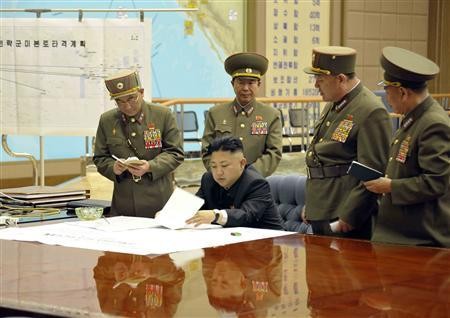Which scenario suit to two Koreas’ relations?
(VOVworld) – The situation on the Korean peninsula is heating hour by hour due to reciprocal threats between Pyongyang and Seoul. Many are wondering whether a full-scale war between the two Koreas will break out as it did 60 years ago. The question is generating a lot of discussion in the international mass media. VOV’s Anh Huyen analyzes the risks.
 |
| Korean leader Kim Jong-un presides over an urgent operation meeting early March 29, 2013 (Photo: Reuters) |
Last Saturday, Pyongyang declared that North-South relations have entered a ‘state of war’ and all issues will be handled in accordance with war time principles. On Sunday, addressing a meeting of the central committee of North Korea’s ruling Workers' Party, top leader Kim Jong-un said that the country's nuclear arsenal should be beefed up in both quality and quantity. He said that Pyongyang will develop nuclear energy to increase its electricity output and conduct more satellite launches. Pyongyang warned that US military bases in Japan and the Republic of Korea will become the first targets of the North’s attacks if a war breaks out on the peninsula. Mr. Kim asked the country’s missile forces to aim missiles US military bases in South Korea and the Pacific after the US flew two nuclear-capable stealth bombers over the Korean peninsula in a rare show of force. Meanwhile, a South Korean military source revealed that the number of personnel and military vehicles has increased at North Korea’s missiles sites. Readiness is seen throughout North Korea – camouflaged armored vehicles and posters calling for the destruction of American imperialists and encouraging the people to fight with arms instead of words. The White House said Pyongyang’s new threats are serious and Washington will work closely with Seoul, its ally in Asia, to monitor provocative acts. The US accused North Korea of being the only reason for tension on the tense in the Korean peninsula. A number of countries including Thailand and the Philippines are making plans to evacuate their citizens from South Korea.
But analysts say a full-scale war is unlikely because it would cause grave losses for all parties involved. What is more likely to happen is that Pyongyang will bring the region to the brink of conflict with many threats and provocations. Pyongyang seems to want to attract public attention, pressure the US to return to the negotiating table, and pressure the newly-elected South Korean President to change South Korea’s policy toward Pyongyang. Another aim is to consolidate North Korea’s internal solidarity, behind its new young leader Kim Jong-un. Another signal that no war will start is that Pyongyang has appointed Pak Pong-ju, known as a reformist, as North Korea’s Prime Minister. This move suggests the country’s leaders are focused on economic reforms. At a recent meeting of the ruling Workers' Party, Kim Jong-un announced a new strategic policy for the North in which the economy and nuclear weapons will be developed concurrently. This means Pyongyang is unlikely to launch a military attack against Seoul and Washington in the near future. These days, contrary images can be seen in Pyongyang. While hundreds of thousands of soldiers, students, and workers raise their fists to show their absolute support to supreme leader Kim Jong-un in the capital city, shops, farms, and factories are operating normally in other parts of the country. A North Korean citizen who lives near the border said tension increases every year when the US and the Republic of Korea conduct joint military exercises. But when the maneuvers conclude, everything returns to normal and it’s hoped that this time is no exception.
In July, the two Koreas will celebrate 60 years since the signing of the ceasefire agreement which ended a bloody 3-year war which claimed the lives of more than 3 million people. 60 years later, Seoul has become one of the world’s leading economies, while Pyongyang is struggling to find a post-war outlet, with a per capita income equal to that of sub-Saharan countries. It’s time Pyongyang enacted reforms to open its economy. Despite economic embargos by the US and other Western nations, Pyongyang has been determined to develop its nuclear arsenal.
Anh Huyen